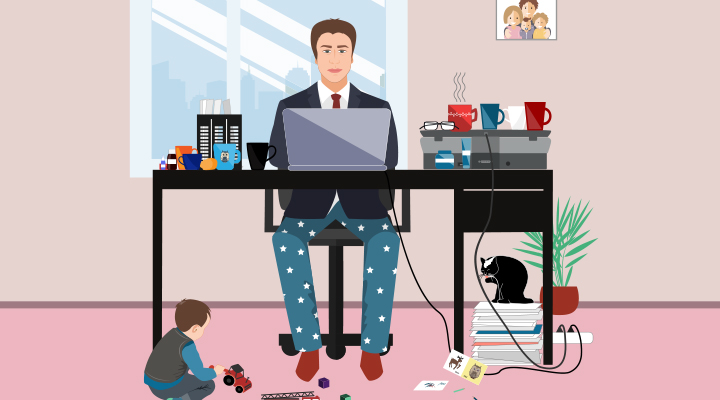Psychology of Remote Work
17 Dec 2020 - Posted by Mateusz Swidniak, Kasia ZurawskaThis is the first in a series of non-technical blog posts aiming at discussing the opportunities and challenges that arise when running a small information security consulting company. After all, day to day life at Doyensec is not only about computers and stories of breaking bits.
The pandemic has deeply affected standard office work and forced us to immediately change our habits. In all probability, no one could have predicted that suddenly the office was going to be “moved”, and the new location is a living room. Remote work has been a hot topic for many years, however the current situation has certainly accelerated the adoption and forced companies to make a change.
At Doyensec, we’ve been a 100% remote company since day one. In this blog post, we’d like to present our best practices and also list some of the myths which surround the idea of remote work. This article is based on our personal experience and will hopefully help the reader to work at home more efficiently. There are no magic recipes here, just a collection of things that work for us.
5 standard rules we follow and 7 myths that we believe are false

Five Golden Rules
1. “Work” separated from the “Home” zone
The most effective solution is to work in a separate and dedicated room, which automatically becomes your office. It is important to physically separate somehow the workplace from the rest of the house, e.g. a screen, small bookcase or curtain. The worst thing you can do is work on the couch or bed where you usually rest. We try not to review source code from the place where we normally eat snacks, or debug an application in the same place we sleep. If possible, work at a desk. It will also be easier for you to mobilize yourself for a specific activity. Also, make sure that your household, especially your young children, do not play in your “office area”. It will be best if this “home office space” belongs exclusively to you.
2. The importance of a workplace
Prepare a desk with adequate lighting and a comfortable chair. We emphasize the need for a functional, ergonomic chair, and not simply an armchair. It’s about working effectively. The time to relax will come later. Arrange everything so that you work with ease. Notebooks and other materials should be tidied up on the desk and kept neat. This will be a clear, distinguishing feature of the work place. Family members should know that this is a work area from the way it looks. It will be easier for them to get used to the fact that instead of “going to work,” work related responsibilities will be performed at home. Also, this setup gives an opportunity to make security testing more efficient - for example by setting up bigger screens and ready to use testing equipment.
3. Control your time (establish a routine)
A flexible working time can be treacherous. There are times when an eight hour working day is sufficient to complete an important project. On the other hand, there are situations where various distractions can take attention away from an assigned task. In order to avoid this type of scenario, fixed working hours must be established. For example, some Doyensec employees use BeFocused and Timing apps to regulate their time. Intuitive and user friendly applications will help you balance your private and professional life and will also remind you when it’s time to take a break. Working long hours with no breaks is the main source of burnout.
4. Find excuses to leave your house (vary the routine)
Traditional work is usually based on a structured day spent in an office environment. The day is organized into work sessions and breaks. When working at home, on the other hand, time must be allotted for non-work related responsibilities on a more subjective basis. It is important for the routine to be elastic enough to include breaks for everything from physical activity (walks) to shopping (groceries) and social interaction. Leaving the house regularly is very beneficial. A break will bring on a refreshed perspective. The current pandemic is obviously the reason why people spend more time inside. Outside physical activities are very important to keep our minds fresh and a set of new endorphins is always welcome. As proof of evidence, our best bugs are usually discovered after a run or a walk outside!
5. Avoid distractions
While this sounds like simple and intuitive advice, avoiding distractions is actually really difficult! In general it’s good to turn off notifications on your computer or phone, especially while working. We trust our people and they don’t have to be immediately 100% reachable when working. As long as our consultants provide updates and results when needed, it is perfectly fine to shutdown email and other communication channels. Depending on personal preference, some individuals require complete silence, while others can accomplish their work while listening to music. If you belong to that category of people who cannot work in absolute silence and normal music levels are too intense, consider using white noise. There are applications available that you can use to create a neutral soundtrack that helps you to concentrate. You can easily follow our recommendation on Spotify: something calm, maybe jazz style or classy.

Seven Myths
Let’s now talk about some myths related to remote work:
1. Remote employees have no control over projects
At Doyensec, we have successfully delivered hundreds of projects that were done exclusively remotely. If we are delivering a small project, we usually allocate one security researcher who is able to start the project from scratch and deliver a high quality deliverable, but sometimes we have 2-3 consultants working on the same engagement and the outcome is of the same quality. Most of our communication goes through (PGP-encrypted) emails. An instant messenger can help a great deal when answers are needed quickly. The real challenge is in hiring the right people who can control the project regardless of their physical location. While employing people for our company, we look at both technical and project management skills. According to Jason Fried and Davis Heinemeier Hansson, 37 Signal co-founders, you shouldn’t hire people you don’t trust (Remote). We totally agree with this statement.
2. Remote employees cannot learn from colleagues
The obvious fact is that it is easier to learn when a colleague is physically in the same office and not on the other side of the screen, but we have learned to deal with this problem. Part of our organizational culture is a “screen sharing session” where two people working on the same project analyze source code and look for vulnerabilities together. During our weekly meetings, we also organize a session called “best bugs” where we all share the most interesting findings from a given week.
3. Remote work = lack of work & life balance?
If a person is not able to organize his/her work day properly, it is easy to drag out the work day from early in the morning to midnight instead of completing everything within the expected eight hours. Self discipline and iterative improvements are the key solutions for an effective day. Work/life balance is important, but who said that forcing a 9am-5pm schedule is the best way to work? Wouldn’t it be better to visit a grocery store or a gym in the middle of the day when no one is around and finish work in the evening?
4. Employees not under control
Healthy remote companies rely on trust. If they didn’t then they wouldn’t offer remote work opportunities in the first place. People working at home carry out their duties like everyone else. In fact, planning activities such as gym-workouts, family time, and hobbies is much easier thanks to the flexible schedule. You can freely organize your work day around important family matters or other responsibilities if necessary.
Companies should be focused on having better hiring processes and ensuring long-term retention instead of being over concerned about the risk of “remote slacking”. In fact, our experience in the past four years would actually suggest that it is more challenging to ensure a healthy work/life balance since our researchers are sufficiently motivated and love what they do.
5. Remote work means working outside the employer’s office
It should be understood that not all remote work is the same. If you work in customer service and receive regular calls from customers, for example, you might be working from a confined space in a separate room at home. Remote work means working outside the employer’s office. It can mean working in a co-working space, cafeteria, hotel or any other place where you have a good Internet connection.
6. Remote work is lonely
This one is a bit tricky since it’s technically true and false. It’s true that you usually sit at home and work alone, but in our security work we’re constantly exchanging information via e-mails, Mattermost, Signal, etc. We also have Hangouts video meetings where we can sync up. If someone feels personally isolated, we always recommend signing up for some activities like a gym, book club or other options where like-minded people associate. Lonely individuals are less productive over the long run. Compared to the traditional office model, remote work requires looking for friends and colleagues outside the company - which isn’t a bad thing after all.
7. Remote work is for everyone
We strongly believe that there are people who will still prefer an onsite job. Some individuals need constant contact with others. They also prefer the standard 9am-5pm work schedule. There is nothing wrong with that. People that are working remotely have to make more decisions on their own and need stronger self-discipline. Since they are unable to engage in direct consultation with co-workers, a reduction of direct communication occurs. Nevertheless, remote work will become something “normal” for an increasing number of people, especially for the Y and Z generation.

